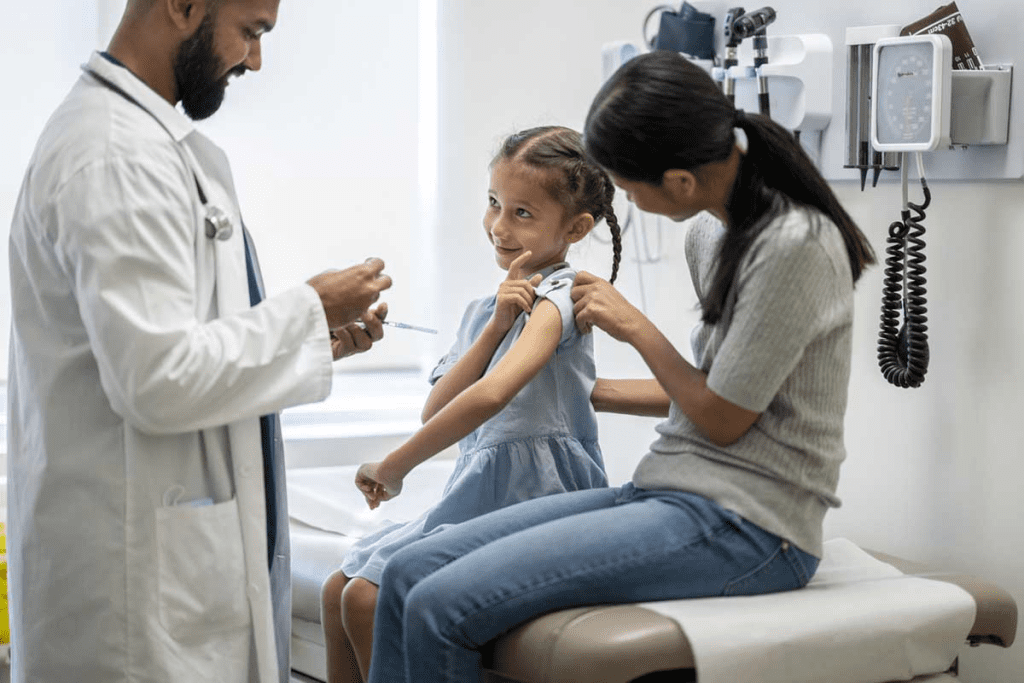Last Updated on November 14, 2025 by
Figuring out if a child has a developmental delay is a team effort. Parents, doctors, and specialists all play a part. We work together to spot delays early. This helps us start helping the child right away, which can make a big difference in their life.

Finding delays early is key. We use many ways to do this. Parents watch their child closely and tell their doctor if they notice anything different. Then, doctors and specialists check how the child is doing and help them in any way they can.
Spotting developmental delays early can greatly help a child’s growth. About 10“15% of preschool kids face these issues. This is a big worry for parents and doctors.
A developmental delay means a child misses milestones on time. These can be global, hitting many areas, or specific, focusing on one skill like speech or motor skills.
The term “global developmental delay” is for kids under 5 with big delays in many areas. The ICD-10 system helps doctors diagnose and plan treatments the same way.
Parents usually spot the first signs of delays. Look out for:
It’s key to catch these signs early for the best help. If you think your child might be delayed, talk to your doctor right away.
It’s important to know how many U.S. kids face developmental delays. These delays stop them from hitting developmental milestones.
About 15% of U.S. kids aged 3“17 have at least one developmental delay. This shows we need to act fast to help these kids.

Developmental delays in kids are a big worry in the U.S. More kids are being diagnosed, thanks to better tests and more awareness.
There are many kinds of developmental delays, like speech and motor skills. Each needs its own help plan.
Who gets diagnosed with developmental delays matters a lot. Things like money, gender, and health care access play big roles. Poorer kids and boys are often at higher risk.
Knowing these facts helps us focus our help better. This way, we can improve developmental skills for those who need it most.
As a parent, you’re often the first to spot if your child is not developing properly. Your observations and worries are key in spotting potential delays early. By knowing the signs and when to ask for help, you can help your child get the support they need.
Developmental delays can show up in many ways, like missed milestones or odd behaviours. Some common signs include:
Remember, every child grows at their own pace. But if your child is way behind or losing skills, talk to your healthcare provider. They often spot delays during routine check-ups, as experts suggest.

If you worry about your child’s development, share your concerns with your healthcare provider. Here’s how:
“Early intervention is crucial for developmental delays,” says A pediatrician with over 10 years of experience. “Parents should feel empowered to talk about their worries with their child’s healthcare provider.”
By being proactive and teaming up with healthcare pros, you can make sure your child gets the support they need to do well.
Primary care physicians and pediatricians are key in spotting developmental delays in kids. They watch over a child’s growth closely. This makes them vital in catching problems early.
Well-child visits include important screenings at ages 9, 18, and 30 months. Doctors check if a child is developing as they should. These quick checks help spot kids who need more detailed tests.
Parents should share any worries they have about their child’s growth. This teamwork helps doctors understand the child’s development fully.
Doctors use tested tools to check how kids are developing. These tools are made to be accurate and reliable. They help doctors find any developmental delays.
With these tools, doctors can start helping kids early. They can also send kids to specialists if needed. This ensures kids get the help they need to do well.
Early detection is key to helping kids with developmental delays. Parents and doctors working together can spot problems early. This way, they can help a child grow and develop.
When a child is sent to see a developmental pediatrician or specialist, it’s a big step. It means they’re getting help to understand and meet their developmental needs. These experts do a detailed check to find out why a child might be delayed. They then help create a plan to help the child catch up.
A referral to a developmental pediatrician or specialist happens when there are ongoing concerns about a child’s development. These specialists are trained to handle children with developmental delays. The American Academy of Pediatrics says these doctors are key in diagnosing and managing these issues in kids.
The evaluation process is detailed and thorough. It includes:
After this evaluation, parents and caregivers can understand their child’s needs better. They can work with healthcare providers to create a plan that supports their child’s growth.
Teachers and school psychologists often spot signs of global developmental delay in kids. They play a key role in watching over developmental skills and finding issues early.
Educational experts are trained to check on kids’ growth. They look for delays in development in areas like thinking, moving, and social skills. This helps them find kids who might need extra help.
They use regular checks and tests, like special tools, to see how kids are doing. They look for signs like trouble with talking, motor skills, and social or emotional issues.
Early intervention programs help kids with developmental delays. They offer services like speech therapy and occupational therapy to boost skills.
These programs do more than just help kids. They also support families. This creates a caring space for kids to grow.
Together, teachers and early intervention teams can really help kids with developmental delays. Their teamwork ensures kids get the support they need to reach their full potential.
Managing developmental delay needs a team effort. Healthcare experts work together to help children with delays. This team approach is key to success.
Developmental delay affects children in many ways. It needs a treatment plan that covers all aspects. The ICD-10 codes help doctors accurately diagnose and bill for these delays.
A team of experts is vital for tackling global dev delay. This team includes doctors, psychologists, and therapists. They all play a crucial role.
Together, they assess the child’s development. They pinpoint delays and craft a special plan. This team effort ensures a well-rounded treatment.
LivHospital is a leader in treating developmental delays. They use the latest methods and research. Their team works closely with families to create a personalized plan.
The hospital’s focus on teamwork and technology helps children get the best care. LivHospital shows how a team effort can lead to better results for children with delays.
We see LivHospital’s approach as crucial for helping children with developmental delay. By working together, healthcare professionals can offer top-notch care. This improves the lives of children and their families.
Identifying and addressing developmental delays is a team effort. Parents, healthcare providers, and educators must work together. This way, children with delays get the support they need to succeed.
It’s important to understand what developmental delays mean. These delays happen when a child’s physical, cognitive, or emotional growth is far behind. Recognizing these signs early helps us help children catch up.
Early action is key in helping children with delays. By joining forces, we can make sure kids get the help they need. This way, they can overcome their challenges and reach their highest potential.
A developmental delay happens when a child doesn’t hit certain milestones on time. This can affect their physical, mental, or emotional growth.
Signs include not sitting, standing, or walking when they should. Kids might also struggle with talking, social skills, or thinking.
Doctors and specialists work together with parents to spot delays. They use screenings and detailed checks to figure it out.
Parents are key in spotting issues early. They should talk to doctors if they notice something off, so kids can get help fast.
About 15% of kids in the U.S. aged 3“17 have a developmental delay. The rates can change based on who the child is.
Early help is very important. It lets kids get the therapy and education they need, which helps them a lot in the long run.
Doctors check kids during regular visits. They use special tools to find delays and send kids to experts if needed.
Kids get a full check-up to see how they’re doing. This includes looking at their physical, thinking, and emotional health.
Teachers and school experts watch for delays. Early programs give kids the help they need, like therapy and special education.
A team of experts from different fields works together. They help understand a child’s needs and plan the best way to help them.
Global developmental delay means a child is really behind in many areas. This includes thinking, moving, and talking, and they need a lot of support.
No, they’re related but different. Delays mean a child is slow to reach milestones. Disabilities are more serious and need ongoing help.
Baird, G., McConachie, H., & Scrutton, D. (2000). Diagnosing developmental delay in children: A systematic review. Archives of Disease in Childhood, 82(3), 198-206. Retrieved from https://adc.bmj.com/content/82/3/198Boyle, C. A., Boulet, S., Schieve, L. A., Cohen, R. A., Blumberg, S. J., Yeargin-Allsopp, M., … & Kogan, M. D. (2011). Trends in the prevalence of developmental disabilities in US children, 1997“2008. Pediatrics, 127(6), 1034-1042. Retrieved from https://pediatrics.aappublications.org/content/127/6/1034Dworkin, P. H., & Ehrlich, A. R. (1992). Medical screening of early childhood developmental disabilities. American Journal of Diseases of Children, 146(7), 777-784. Retrieved from https://journals.lww.com/ajdc/Abstract/1992/07000/Medical_screening_of_early_childhood_developmental.19.aspx
Subscribe to our e-newsletter to stay informed about the latest innovations in the world of health and exclusive offers!